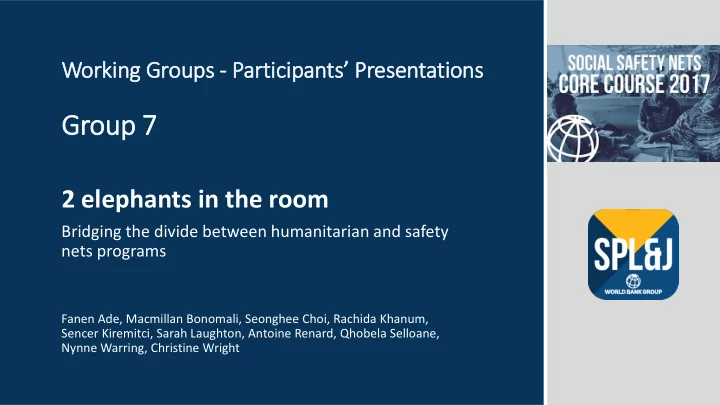

Workin ing Groups - Partic icipants ’ Presentations Group 7 2 elephants in the room Bridging the divide between humanitarian and safety nets programs Fanen Ade, Macmillan Bonomali, Seonghee Choi, Rachida Khanum, Sencer Kiremitci, Sarah Laughton, Antoine Renard, Qhobela Selloane, Nynne Warring, Christine Wright
Agenda 1. Humanitarian Assistance / Social Safety Net – Any Bridge? 2. Bridging rationale 3. Key bridging challenges / Emerging Practices
Questions – Clicker survey In your country, has humanitarian assistance/response been an “opportunity” to build-up your Social Safety Net (SSN), or to strengthen your existing SSN ? A = Yes B = No C = Not relevant / No interaction between Humanitarian - SSN
Humanitarian – Social Safety Net Is Is there any bridge? Humanitarian programs are designed with life-saving purposes. Timeline: short time horizons and in line with humanitarian principles. Safety nets tend to adopt a longer-term view. They are a component of broader social protection/country systems, are enshrined in legislation in some cases, and are often financed by governments themselves. Objectives/Timeline/Coverage/Political – Donor agenda
Humanitarian – Social Safety Net Is Is it a b bridge too far?
Questions – Clicker survey What do you believe is the largest transfer provider? A = Humanitarian Assistance B = Country Social Safety Nets C = Remittance
Bridging rationale Recurrence of shocks and type of shocks Natural disasters have occurred increasingly frequently since the 1960s SSN face various type of shocks: chronic, structural crisis needs; seasonal variations; and exceptional needs that give rise to a humanitarian crisis SSN - Coverage opportunity (ASPIRE 2015) 1.9 billion people via SSN (in-kind transfers & cash-based transfers) USD 329 billion in 2015 - Total spending on social safety nets in 120 developing countries Humanitarian Assistance – Scope (ALNAP 2015) USD 25 billion in 2014 – Total humanitarian expenditures (ALNAP 2015) Increased number of SSN/Humanitarian joint responses
Poli licy Frame Bri ridging Humanitarian – Socia ial Protection / SSN SDGs – Vision 2030 (Oct 2015) : a common framework for prioritising action Where people live in extreme poverty and hunger without basic services, these should be populations of concern to both development and humanitarian actors and that both have a role. World Humanitarian Summit / Grand Bargain (May 2016) SPIAC – “ support the further expansion and strengthening of social protection systems to continue to address chronic vulnerabilities and to scale up the utilization of social protection as a means of responding to shocks and protracted crises” Principles 2 and 10 – “ work to remove or reduce barriers that prevent organisations and donors from partnering with local and national responders” “Increase social protection programmes and strengthen national and local systems and coping mechanisms in order to build resilience in fragile contexts ”. Context will still matter (Humanitarian Principles)
Questions – Clicker survey In terms of the humanitarian – development SSN nexus, what where the key challenges you faced? A = Targeting B = Coordination C = Delivery System D = Value of assistance E = Tension among humanitarian assisted population / SSN assisted population F = Donor Agenda / Conditions G = All of the above
Key challenges in bridging DELIVERY INSTITUTIONAL SYSTEM CHALLENGES CHALLENGES HUMANITARIAN POLITICAL CRISIS / STATE OF CHALLENGES EMERGENCY SEASONAL NATURAL DISASTER / SHOCK h PROTRACTED / STRUCTURAL CRISIS Strength of Type of shocks national SSN Non-existent/Nascent Mature Fragile/Commitment/Expanding Weak/inexperienced SSN
Challenges in in bridging POLITICAL CHALLENGES Issue: Establishment of the Transfer Value: • Refugees/IDPs - Host Population • Humanitarian vs Chronic Emerging practices: Agreed Minimum Expenditure Basket (Gvt/Communities/Huma - Dev Partners) Example: Cameroon (2017) / Mali (2017) Different transfer modality for top-up Example: Fiji (2016), Ecuador (2016) Alignment to Country Transfer Value (SSN, Minimum Wage, etc.) Example: Turkey, Niger
Challenges in in bridging INSTITUTIONAL CHALLENGES Issue: Coordination among different ministries or institutions • MoSA / Ministry of Interior – Civil Protection / Ministry of Human Affairs, etc.) • Humanitarian Stakeholders. Emerging practices: Coordination cell Example: LAC Region Protocol among ministries and reliance a joint household database / Integrated Social Assistance System Example: Turkey (2016 – 2017) Memorandum of Understanding among key Humanitarian Stakeholders Example: Lebanon (2016 - 2017)
DELIVERY Challenges in in bridging SYSTEM CHALLENGES Issue: Use of separate delivery systems Emerging Practices Integrated system for beneficiary information management and advance Social Registry (as EPR) Alignment up to Integration to National SSN Delivery Status Examples Piggybacking + Horizontal : Philippines (4P - 2014), Turkey (MoFSP - 2016 + protracted) Piggybacking + Horizontal + Vertical: Ecuador (2016) Huma Response to strengthen Delivery System for country SSN: Lebanon (2016 – ongoing) Transfer modality to remain flexible / Potential in optimizing digital transfer
So a mouse & an elephant?
Literature Responding to a Crisis: The Design and Delivery of Social Protection. Working Paper. London: Overseas Development Institute (ODI), Bastagli, F. (2014) Delivering social protection in the aftermath of a shock: Lessons from Bangladesh, Kenya, Pakistan and Viet Nam. ODI, London. Bastagli, F. and Holmes, R. (2014) Cash Transfers and Resilience: Strengthening Linkages between Emergency Cash Transfers and National Social Transfer Programmes in the Sahel. Discussion paper prepared for the Cash Learning Partnership. Oxford: CaLP, Cherrier C. (2014) The state of the Humanitarian System (ALNAP – 2015) Shock-Responsive Social Protection Systems: A research programme for DFID. Working paper 1: Conceptualising shock-responsive social protection. Oxford Policy Management (2015) Bridging the humanitarian-development divide - Background Paper for the World Humanitarian Summit side event - “ Making the SDGs work for Humanitarian Needs ”(ACF – NRC – SDSN – May 2016) Sorting through the Hype: Exploring the Interface between Humanitarian Assistance and Safety Nets. Social Protection & Labour Policy Note. Washington, DC: World Bank, Gentilini, U (2016) The Grand Bargain – A Shared Commitment to Better Serve People in Need (May 2016) Upcoming: Study on Shock-Responsive Social Protection in Latin America and the Caribbean. OPM/WFP (2017) Study on Shock-Responsive Social Protection in Latin America and the Caribbean, Country Case Studies (Ecuador, Guatemala, Haiti). OMP/WFP (2017)
Recommend
More recommend